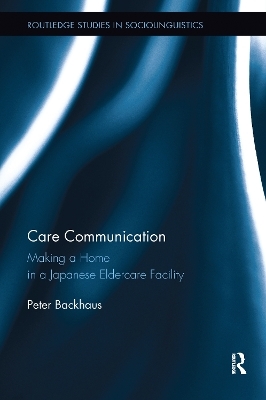
Care Communication
Making a home in a Japanese eldercare facility
Seiten
2021
Routledge (Verlag)
978-0-367-41066-7 (ISBN)
Routledge (Verlag)
978-0-367-41066-7 (ISBN)
Combining quantitative and qualitative methods, the analysis explores the characteristics of care communication in institutional eldercare as they manifest in the interactional small print. The research findings are contextualised with results from previous studies, tracing significant features and explanation for deviant cases.
This book studies communication in institutional eldercare. It is based on audio-recorded interactions between residents and staff in a Japanese care facility. The focus is on the morning care routines, which include getting the residents out of bed and ready for the day. Combining quantitative and qualitative methods, the analysis explores the characteristics of care communication as they become manifest in the interactional small print. Topics include the use of terms of address and formal speech, the basic organisation of openings and closings, the difficulties of talking while working—and, at times, working while talking—and tempo differences between residents and staff as they move along between bed and breakfast. The research findings are contextualised with results from previous studies, tracing significant features and explanation for deviant cases.
The author is a trained linguist and certified nursing assistant with first-hand working experience in institutional eldercare.
This book studies communication in institutional eldercare. It is based on audio-recorded interactions between residents and staff in a Japanese care facility. The focus is on the morning care routines, which include getting the residents out of bed and ready for the day. Combining quantitative and qualitative methods, the analysis explores the characteristics of care communication as they become manifest in the interactional small print. Topics include the use of terms of address and formal speech, the basic organisation of openings and closings, the difficulties of talking while working—and, at times, working while talking—and tempo differences between residents and staff as they move along between bed and breakfast. The research findings are contextualised with results from previous studies, tracing significant features and explanation for deviant cases.
The author is a trained linguist and certified nursing assistant with first-hand working experience in institutional eldercare.
Peter Backhaus is Associate Professor at Waseda University, Tokyo. His main research interests are sociolinguistics, pragmatics, and writing and orthography. Publications include Linguistic Landscapes: A Comparative Study of Urban Multilingualism in Tokyo (Multilingual Matters, 2007) and Communication in Elderly Care: Cross-cultural Perspectives (ed., Continuum, 2011).
1. Introduction
2. Background and Previous Research
3. Data and Methodology
4. Honorifics
5. Openings and Closings
6. Talk at Work
7. Tempo
8. Conclusions
| Erscheinungsdatum | 02.12.2019 |
|---|---|
| Reihe/Serie | Routledge Studies in Sociolinguistics |
| Zusatzinfo | 24 Tables, black and white; 2 Line drawings, black and white; 2 Illustrations, black and white |
| Verlagsort | London |
| Sprache | englisch |
| Maße | 156 x 234 mm |
| Gewicht | 370 g |
| Themenwelt | Sachbuch/Ratgeber ► Gesundheit / Leben / Psychologie |
| Schulbuch / Wörterbuch ► Wörterbuch / Fremdsprachen | |
| Geisteswissenschaften ► Sprach- / Literaturwissenschaft ► Sprachwissenschaft | |
| Sozialwissenschaften ► Pädagogik ► Sozialpädagogik | |
| Sozialwissenschaften ► Soziologie ► Spezielle Soziologien | |
| ISBN-10 | 0-367-41066-4 / 0367410664 |
| ISBN-13 | 978-0-367-41066-7 / 9780367410667 |
| Zustand | Neuware |
| Haben Sie eine Frage zum Produkt? |
Mehr entdecken
aus dem Bereich
aus dem Bereich
Das umfassende Standardwerk auf der Grundlage der aktuellen amtlichen …
Buch | Hardcover (2024)
Duden (Cornelsen Verlag)
35,00 €


